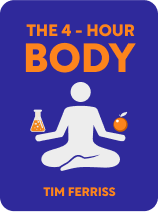

This article is an excerpt from the Shortform book guide to "The 4-Hour Body" by Timothy Ferriss. Shortform has the world's best summaries and analyses of books you should be reading.
Like this article? Sign up for a free trial here .
What is performance science? What does Tim Ferriss say about performance science in The 4-Hour Body?
Performance science is the study of what improves or damages a body’s performance. In The 4-Hour Body, Tim Ferriss uses performance science for self-experimentation.
Read on for more about performance science and how to use it for your own self-experimentation.
Brush Up on Performance Science
To start your self-experimentation journey, you’ll want to brush up on the cutting edge of performance science. Unfortunately, “common sense” and published research aren’t always accurate, and you’ll need to learn to distinguish what’s legitimate from what’s propaganda.
Always keep the following in mind when you encounter new information on this topic:
1. The language around health can be misleading. Sometimes, health advertising is full of meaningless terms that cause confusion. Whenever you hear a term, ask yourself if you can measure it, and if you can’t, you should avoid it. (For example, a program that will make you “strong enough to do ten chin-ups” is measurable, while one that promises to make you “strong and healthy” isn’t.) There are two specific types of terms to avoid:
- Marketer-speak. These terms have no physiological basis and are used to sell you something or scare you into buying something. For example, “cellulite” is marketer-speak: It first appeared in Vogue in 1968 because the magazine was running out of fashion content and invented a problem in order to give themselves content to write about. Cellulite is simply fat; it’s not a disease.
- Scientific-sounding terms. These words don’t actually have a basis in science and are used in so many contexts that they no longer have much meaning. For example, “optimal” is a scientific-sounding term that doesn’t mean anything—optimal only has meaning when applied towards a specific goal.
2. Existing recommendations are based on incomplete knowledge. Humanity doesn’t fully understand how the world works and performance science is no different. When it comes to food, there are probably nutrients no one has isolated yet, and it’s impossible to identify a deficiency in something unknown. Additionally, taking nutrients in isolation (as supplements, rather than getting them through food) can have unexpected effects.
- For example, many people took beta-carotene supplements, but taking beta-carotene by itself can create many health problems such as increasing the risk of brain hemorrhages.
3. Women and men don’t need to train differently—that’s just a myth invented by marketers. Most of the time, everyone wants the same thing—a little bit more muscle and less fat—and everyone should do the same thing to achieve this. There are two relevant differences between men and women, but neither necessitates a different type of training method:
- On average, women have less than 10% as much testosterone as men, so they don’t grow muscle as quickly. As a result, there’s no need to worry about bulking up overnight—it won’t happen, even if you’re a woman who has a higher amount of testosterone than average. If you do start to see visible changes to your muscles you don’t like over time, you can change your program.
4. Your genes affect your body, but they don’t rule it. While you might be more likely to be overweight or have a particular type of muscle, you can overcome a predisposition.
- For example, you inherit one of two muscle types from your parents: slow-twitch (good at endurance) and fast-twitch (good for sprints and strength). However, you can change the amount of both types by training.
5. A “drug” is anything that you ingest that affects your body (except whole foods). Different names and categories for drugs—supplements, over-the-counter, and so on—don’t indicate what’s effective or safe.
6. It’s not always easy to tell what factor is causing a result. Ask yourself three questions:
- Have you correctly identified the result? For example, sprinters have a muscular body type. It’s important to determine whether the body type is a result of training sprinting, or the cause of why people go into sprinting in the first place. The body type is actually the cause, not the result.
- Is it the absence or presence that’s important? For example, is going on a vegetarian diet effective because getting rid of meat makes you live longer, or because adding more vegetables to your diet does? (It’s the second one.)
- Are there other variables at play? For example, if a study tested the effects of yoga on the heart and all the participants in the control group were from the same upper-class demographic, the fact that rich people can afford healthier food might have more to do with the results than yoga.

———End of Preview———
Like what you just read? Read the rest of the world's best book summary and analysis of Timothy Ferriss's "The 4-Hour Body" at Shortform .
Here's what you'll find in our full The 4-Hour Body summary :
- How to do the least amount you need to do for the results you want
- Why you need a cheat day in your diet
- How to improve everything about your body, including sleep, sex, and longevity






